

Clear aligner therapy has changed the way many patients approach orthodontic care. Invisalign® offers a discreet, highly controlled method to move teeth using a sequence of custom-made, virtually transparent trays. For people who want to straighten their smile without traditional brackets and wires, aligners provide an unobtrusive option that fits into a busy life.
Using advanced digital imaging and precise material science, the aligner system is planned from start to finish before treatment begins. That planning allows predictable stages of movement, close oversight from your dentist, and the flexibility to remove the aligners for short periods when necessary. The result is a treatment pathway that feels modern, patient-centered, and manageable.
Modern aligner therapy is built on a repeatable cadence of planning and progression. After a detailed assessment and digital scan, a series of aligners is created to make small, controlled adjustments to tooth position. Each aligner applies gentle pressure at specific points, and patients wear a new tray every one to two weeks to advance toward the agreed final position.
The predictability comes from combining three elements: an accurate three-dimensional model of your mouth, software that maps out incremental movements, and aligners manufactured to tight tolerances. This closed-loop approach — plan, fabricate, wear, evaluate — allows clinicians to anticipate tooth responses and adapt the plan when necessary.
Because the system is based on small, staged movements, clinicians can address a wide variety of alignment concerns from crowding and spacing to certain bite corrections. While some complex skeletal issues still require traditional orthodontics or adjunctive care, many adults and teens are excellent candidates for aligner therapy when their practitioner determines alignment goals are achievable through tooth movement alone.

Invisalign® for Teens

Invisalign® for Brides

Invisalign® for Travelers

Before & After Photos
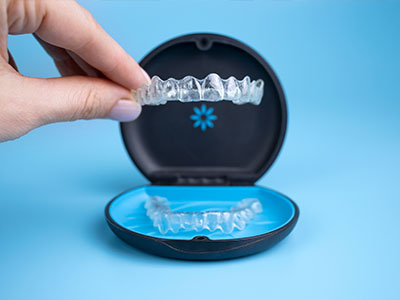
Invisalign® Videos

FAQs
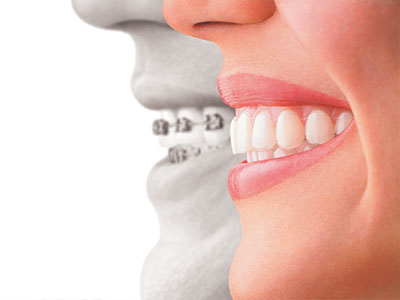
Invisalign® vs Braces
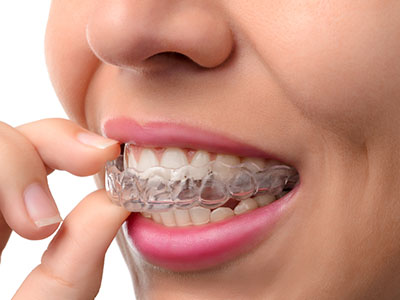
Invisalign® vs Direct-To-Consumer Aligners
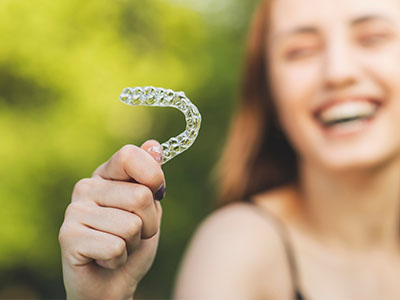
Is Invisalign® Right For Me?
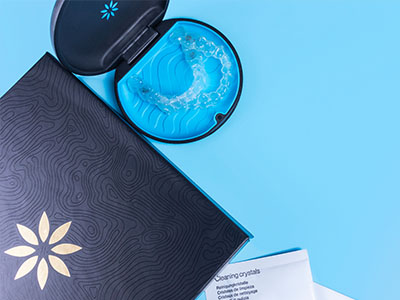
Invisalign® Costs
With aligners that are practically invisible, many patients appreciate the confidence that comes from undergoing treatment without a noticeable appliance. The removable nature of the trays also simplifies daily oral hygiene and eating — you can brush, floss, and enjoy meals without managing brackets or wires.
One of the advantages of digital aligner workflows is visualization. Your clinician can show you a sequence of expected changes and provide a preview of likely outcomes before any physical trays are delivered. That preview helps set realistic expectations and supports shared decision-making between patient and provider.
Digital files are also useful for tracking progress. If a tooth does not move as predicted, clinicians can intervene by refining the plan and issuing additional aligners or attachments as needed. This iterative process keeps the treatment responsive to real-world results while preserving the overall objective.
Because each aligner is fabricated to precise specifications, comfort and fit are improved compared with earlier generations of removable appliances. Patients typically report a short adaptation period and then find the trays easy to wear throughout the day and night, maintaining consistent progress toward the treatment goal.
As pioneers in aligner development and clinical research, Align Technology and its partners base system design on aggregated outcomes and engineering data to enhance control and comfort. The aim is to support clinicians with tools that make complex movement sequences more manageable and to give patients a smoother, more predictable experience.

The treatment journey begins with a comprehensive evaluation where your clinician reviews dental health, bite relationships, and aesthetic priorities. Clear aligner treatment is planned in the context of overall oral health—any active decay, gum concerns, or restorative issues will be addressed before orthodontic movement begins.
During this visit, your provider will discuss what you hope to achieve and translate those goals into measurable objectives. A digital scan or series of impressions captures the current condition of your teeth and serves as the foundation for the full treatment plan.
Understanding your lifestyle and expectations is part of the assessment. Because aligners rely on consistent wear for effectiveness, the clinician and patient agree on a realistic schedule and review care responsibilities, including hygiene and appliance handling.
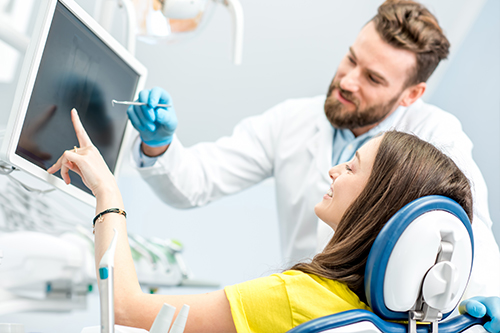
Once records are collected, advanced software is used to map each phase of tooth movement. This planning stage is where precise angulation, rotation, and sequencing are established so that each aligner delivers a predictable incremental change.
Clinicians can preview the projected outcome with patients, making it easier to refine aesthetic goals and address concerns before fabrication. This preview promotes transparency and helps patients feel confident about the path forward.
Because adjustments can be simulated digitally, the plan can incorporate strategies for complex movements, such as interproximal reduction or the use of small tooth attachments to guide rotation and root positioning when necessary.

After the plan is finalized, each aligner is manufactured to match the specified tooth positions for that stage. Modern materials combine clarity with resilience to maintain force delivery while remaining discreet in appearance.
Patients typically receive a series of trays and are instructed on wear time and proper insertion and removal techniques. Good fit is key to effective treatment; during follow-up visits the team checks fit, monitors movement, and confirms that the series is progressing as intended.
If refinements are needed, supplemental aligners can be produced to address areas that require further adjustment, preserving the overall integrity of the treatment plan.

Clear aligner treatment does not end when the teeth reach their planned positions. Retention is an important phase: retainers or prescribed maintenance protocols help maintain the new alignment over time and protect your investment in a healthier smile.
Routine dental care and periodic check-ins allow your clinician to monitor stability and address any minor changes early. Maintaining good oral hygiene and attending scheduled visits supports long-term success.
Our approach emphasizes collaboration: we equip patients with guidance on appliance care and practical tips to preserve alignment while integrating orthodontic outcomes into everyday life.
Short videos highlight typical treatment steps and the technology behind clear aligner therapy.
*Invisalign® is a registered trademark of Align Technology, Inc.
At Lake Minneola Dentistry, our team focuses on safe, evidence-informed approaches to clear aligner care. If you're curious whether aligners are a suitable option for your situation, we can explain the clinical considerations and walk through what treatment would look like for you.
To learn more about Invisalign® and how it might fit into your oral health goals, contact us for additional information or to arrange a consultation. We look forward to helping you explore the best path to a healthier, more confident smile.
There are many options for patients who want to avoid metal braces! The most popular alternative orthodontic treatment is Invisalign®, which are clear plastic aligners designed to straighten teeth. After an examination of your teeth, your dentist will determine which option is best suited to your wants and needs.
According to the Invisalign® website, the cost for treatment is approximately the same as the cost for metal braces. A portion of this cost may be covered by your insurance. Please call us to set up a consultation and discuss potential payment plan options.
The first step is to schedule a consultation with your doctor, so they can devise a treatment plan that is best suited to your individual dental needs. Once approved, you will receive your first set of aligners. Your doctor will then regularly monitor the movement of your teeth and new aligners will be ordered according to the progress made in your treatment plan.
Invisalign® aligners are made of clear, flexible plastic. The company received a patent for this material – SmartTrack® – to be used exclusively for Invisalign treatment purposes. These aligners are FDA approved and nearly invisible!
Your doctor will give you an estimate regarding how long your Invisalign® treatment should take, which will depend on your specific needs. The average length of time for treatment is approximately 12-18 months. However, some patients may see results far sooner. Remember to wear your aligners exactly as instructed by your doctor to obtain the best results.
Your doctor will most likely recommend that you wear retainers following your Invisalign® treatment. This is a precaution that will prevent your teeth from shifting back to their original positioning. It is important to follow your doctor's instructions exactly to ensure long-lasting results.
You must wear your aligners for up to 22 hours daily. You may remove them for eating, drinking and regular oral hygiene.
No. Unlike braces, you may eat whatever you like as long as you remove the aligners before eating. Prior to placing the aligners back on, it is important to brush your teeth and the aligners after you eat.
Like any orthodontic treatment, there is a short adjustment period. The more you speak with the aligners on, the quicker you will adjust.
There will be some pressure and minor discomfort for a day or two after each initial insertion. This is a sign that your teeth are moving sequentially into their final position.
It is recommended that you remove your aligners prior to chewing gum as the gum will stick to the aligners.
We discourage smoking with aligners as the cigarette smoke will tend to discolor them.
Brushing them with toothpaste will keep them fresh and clean.
Regular office visits are every five to six weeks. This will ensure that your Invisalign treatment is progressing as planned.
All orthodontic patients are instructed to wear their retainers at night indefinitely. Sleeping with your retainers in at night will ensure a healthy bite and maintain the new position of your teeth.
Yes, if their teeth, including second molars, have grown in completely.

Ready to schedule your next dental appointment or have questions about our services?
Contacting Lake Minneola Dentistry is easy! Our friendly staff is available to assist you with scheduling appointments, answering inquiries about treatment options, and addressing any concerns you may have. Whether you prefer to give us a call, send us an email, or fill out our convenient online contact form, we're here to help. Don't wait to take the first step towards achieving the smile of your dreams – reach out to us today and discover the difference personalized dental care can make.